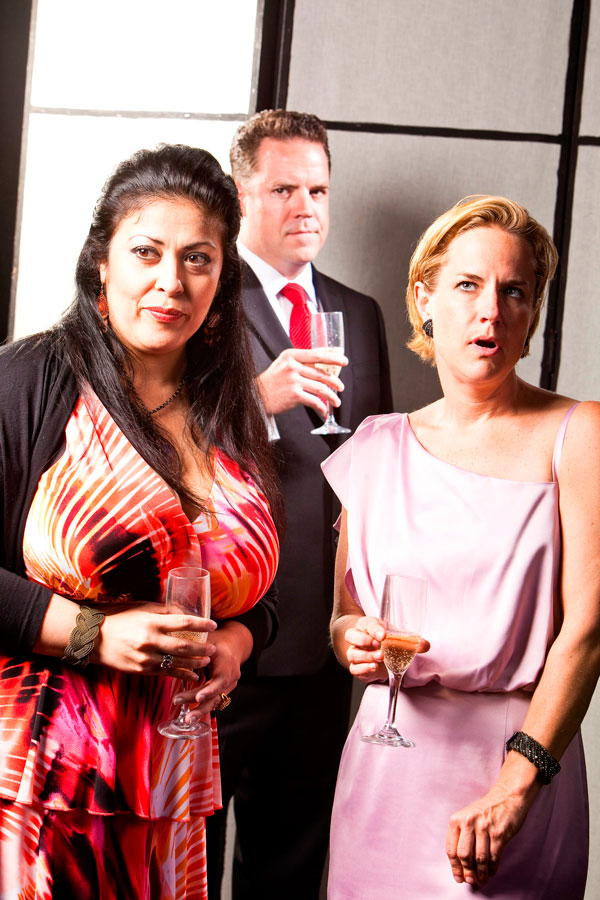Kitchen Dog debuts ‘Ponzi,’ a financial horror story
ARNOLD WAYNE JONES | Life+Style Editor
jones@dallasvoice.com
PONZI
The MAC, 3120 McKinney Ave. Through June 25. $15–$25.
KitchenDogTheater.org.
…………………….
“The rich are different from you and me,” Scott Fitzgerald waxed, to which Hemingway allegedly responded, “Yes — they have more money.” But they are different. Money is never a big deal to people who have it, so they stand above it all. They don’t talk about how much they have, or how much things cost because, at some point, what difference does it make? If you don’t have to work to earn it, its value is fungible.
Then again, losing money — losing a great deal of it — is something everyone can understand. It becomes a source of ego, of pride. How would you feel if you pissed away $20 mil you didn’t deserve in the first place?
That is the situation posed to Catherine (Christina Vela), the regal heiress in Ponzi, the world premiere mainstage production at Kitchen Dog Theater’s New Works Festival. Catherine’s father was a legendary up-from-his-bootstraps self-made man who left Catherine two things: A solid fiscal philosophy and millions in cash to execute it.
She’s honored him by not being as showy and shallow as Allison (Diane Casey-Box), the quintessential nouveau riche Real Housewife, a woman with more cents than sense. Allison and hubby Bryce (Max Hartman) are enraptured by the get-rich-quick scheme of a flashy money manager, and their enthusiasm — plus Bryce’s unabashed flirtation with Catherine, driven in part by his lust for her balance sheet — leads to a series of bad mistakes.
Ponzi should frighten you more than it does, the way the Oscar winning documentary Inside Job did. There’s so much techno-talk — about the gold standard, how Social Security is a classic example of a Ponzi scheme that no one will touch, about how greed feeds pyramid schemes, about the lemming mentality that can cause sensible people to behave irrationally — that it needs to chill you. Like the financial meltdown, it’s not that some people didn’t see it coming; it’s that none of these so-called experts had any idea how reckless they were being. (The use of tarot cards to emphasize the randomness of life and fortune is a witty touch.)
Such horror is a ripe fruit that playwright Elaine Romero should have picked. Instead, she removes some of the universality of the tale by making it so specific to these characters.
That’s not entirely a bad thing. Instead of getting lost in the esoterica of money, she concentrates on the personality traits that drive people to make bad decisions. An undercurrent of sexual tension — between Catherine and Bryce, but just as electric (though more subtly expressed) between Catherine and Allison — makes the seductive power of the purse all the more visceral. Money is the new toy — and it’s a sex toy, at that.
Casey-Box plays the betrayed wife better than just about any actress in town; she’s always quick to turn on the ravenously uncensored switch in her characters’ brains, the one that makes people both pitiable and annoying. It’s delicious fun to watch. Vela is good as Catherine, but her final arc strikes a false note; it seems literary, not realistic.
Even still, the actors ply all these twists in one the KDT’s best-looking plays in years, with lush costumes from Tina Parker and a sleek set by Bryan Wofford. Amid such glam, the seduction of money begins to work on us, too. Maybe more is more, even if we hate to admit it.
This article appeared in the Dallas Voice print edition June 3, 2011.














